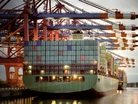[VIDEO] Top 10 manufacturing supply chains

Globalisation and consumer demand are making the art of supply chain management a pivotal component of the manufacturing process, so we take a look at the leading protagonists mastering its international logistics operations, according to Gartner’s latest research:
10. Nike
Like many of the companies in this countdown, Nike’s challenges arise from its global prominence and ensuring that it is being seen to act in a responsible manner, not just in its immediate vicinity, but influencing that same ethos throughout the whole supply chain.
This company achieves this by focusing on the roots of potential problems to ensure sustainability and a personable nature with its partners.
9. Dell
Similarly, Dell sees the importance of industry collaboration as key in optimising its supply chain, making sure that the competitive nature of the tech industry doesn’t overshadow the importance of mutually beneficial relationships with suppliers.
As a result, the company enforces an environment of shared expertise and best practices to get the entire value chain reading from the same hymn sheet.
8. Colgate-Palmolive
Supply chain visibility has been the trigger for Colgate-Palmolive’s supply chain success, while also emphasising the importance of accelerated time to market through its affiliation with SAP over the past 20 years.
Its global network and subsequent reliance on internet sales has recently made its supply chain even more complex before, making partnerships with the likes of SAP even more pivotal to move with the times.
7. Coca-Cola
Coca-Cola has openly stated that it wants to save as much as $1 billion through its supply chain in just the next two years, with the company pinpointing its logistics operations as a cost-cutting opportunity following its recent net income decline.
This comes as part of its productivity and reinvestment imitative which pays special significance to global supply chain optimisation and IT standardisation.
6. Samsung Electronics
As a member of the supply chain hall of fame, Samsung Electronics’ adherence to six sigma and lean strategies has spread its influence across its partners too.
Its infamous ‘Best Practice Analysis’ philosophy incorporates evaluation of some of the world’s leading companies to both learn from and improve upon the most efficient models in manufacturing.
5. Cisco Systems
Cisco Systems is another to base its supply chain motives on lean principles; once again filtering this through its entire operations, from manufacture to customer.
The main advantages enjoyed as a result comprise retiring obsolete processes, reducing or eliminating waste, reducing costs and creating value through its engineering capabilities.
4. Procter & Gamble
Procter & Gamble (P&G) is driving supply chain optimisation through its global sustainability goals, which the company has become so renowned for over the years.
Its commitment to eliminating deforestation in its palm oil supply chain by educating and improving practices alongside its suppliers has won the company great acclaim as it looks to find unique and environmentally significant solutions to supply chain challenges.
3. Intel
Supply chain visibility and transparency is becoming a key component of a trustworthy supply chain, especially among globally operating organisations, and Intel has been vigilant in meeting the demands of this trend.
The chip manufacturer has subsequently partnered with other companies in the IT industry to create and promote a ‘Transparency Task Force’.
2. Unilever
Winning the title of best supply chain in Europe, not for the first time, Unilever has long been applauded for its excellence in the area.
The company has mastered its sustainable operations on a principle of leveraging eight key disciplines consisting of engineering, manufacturing, procurement, logistics, customer service, planning, quality and safety.
1. Apple
While Unilever’s dominance in the European supply chain stakes comes as no surprise, either does Apple’s stranglehold in the global battle.
Being a marked man at the top of the pile inevitably presents its own set of unique challenges, and Apple has come in for criticism in the past, and most recently due to the speed it can get its products to market.
Once again though, Apple has responded accordingly, seeking to increase the control that it has over its supply chain by manufacturing its own components and increasing the size of orders.
Combine this internal control with its already renowned visibility and hands-on approach to the design of its products, and one of the world’s most influential brands is likely to hold on to top spot for many more years to come.
- BMW: Creating Economic Circularity through Battery CreationSustainability & ESG
- Top 10: Trends of 2024Production & Operations
- Deloitte: The Key to Optimising Holiday Supply ChainsProcurement & Supply Chain
- McKinsey: How Manufacturers can Ensure Future ProductivityProcurement & Supply Chain

